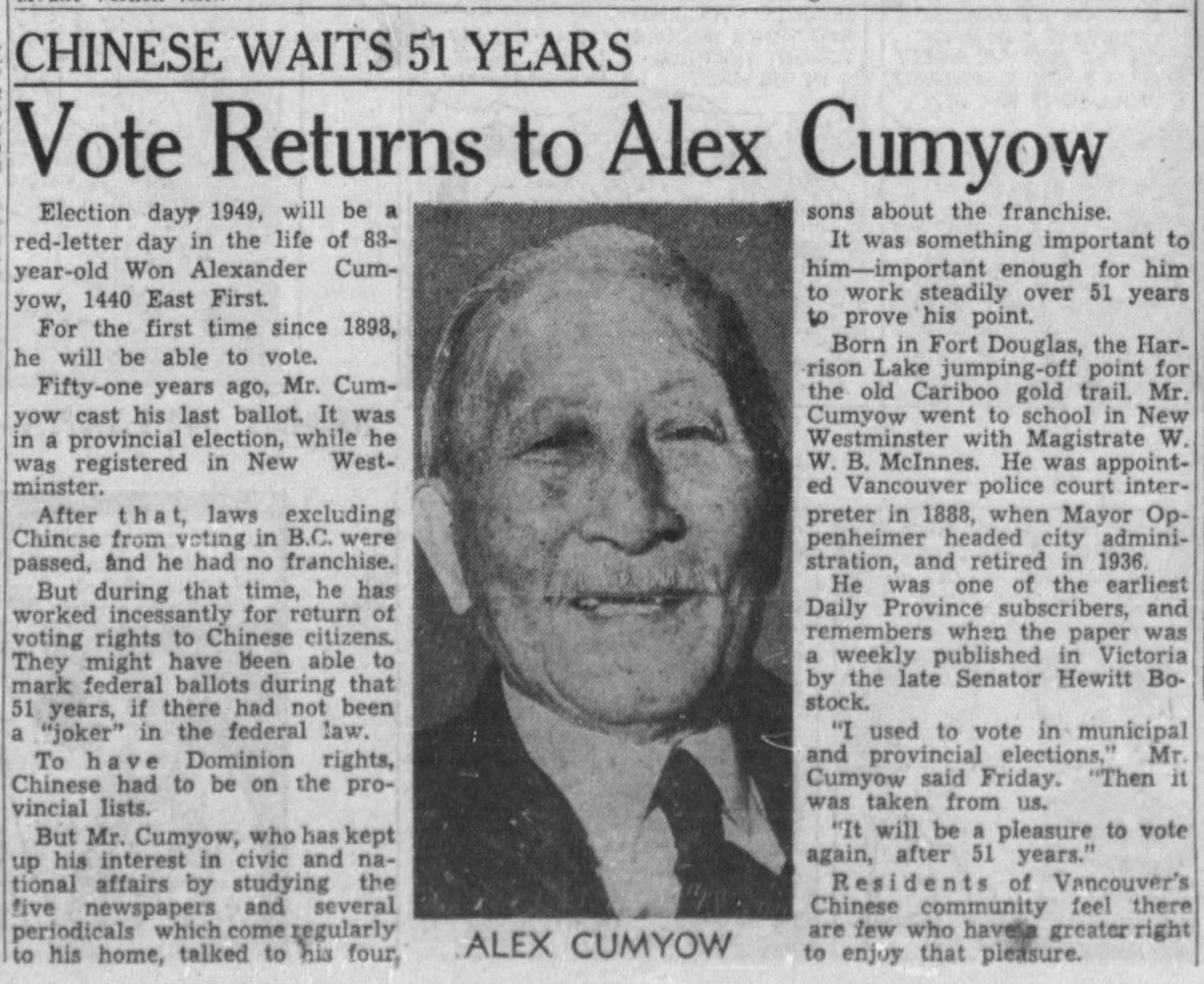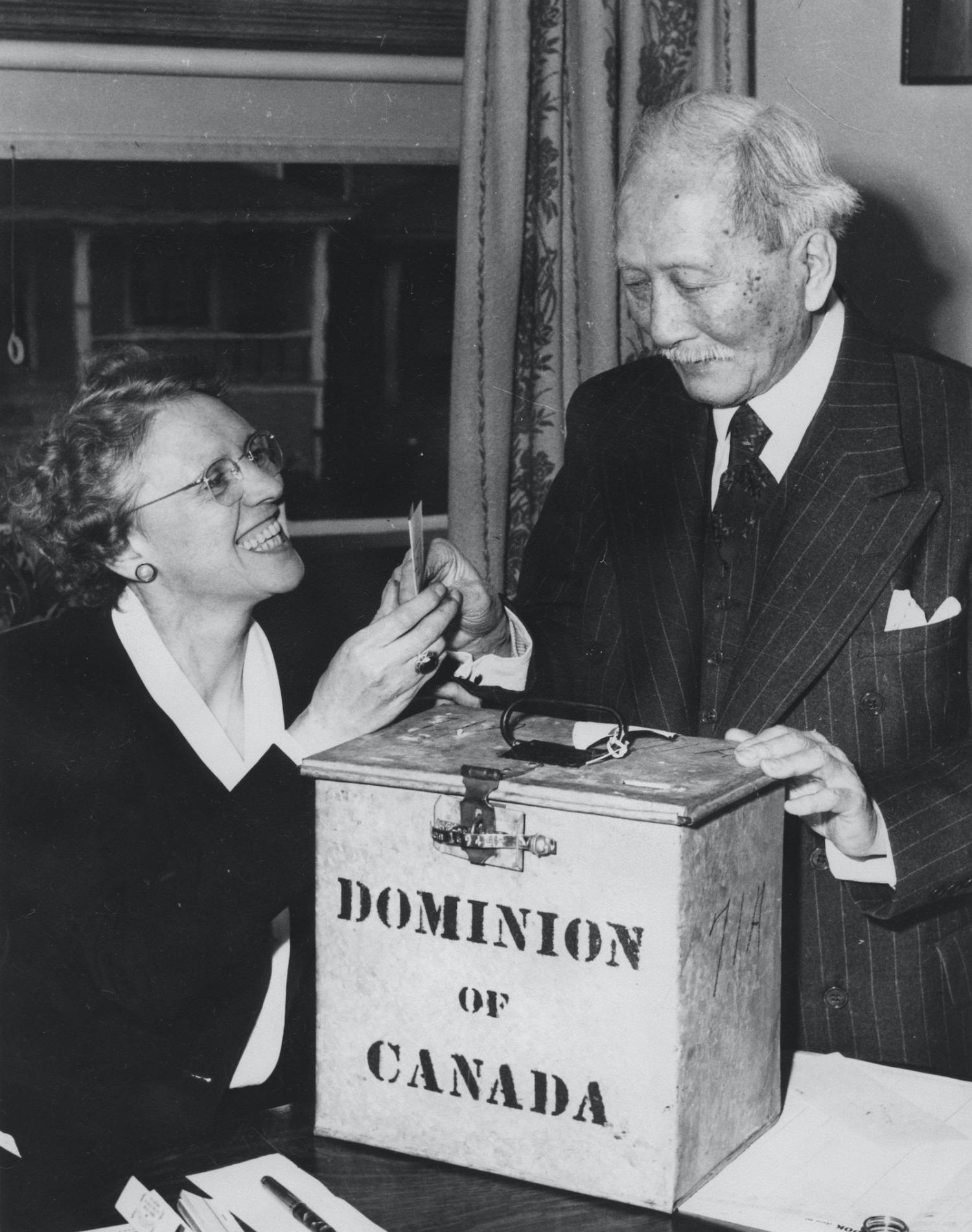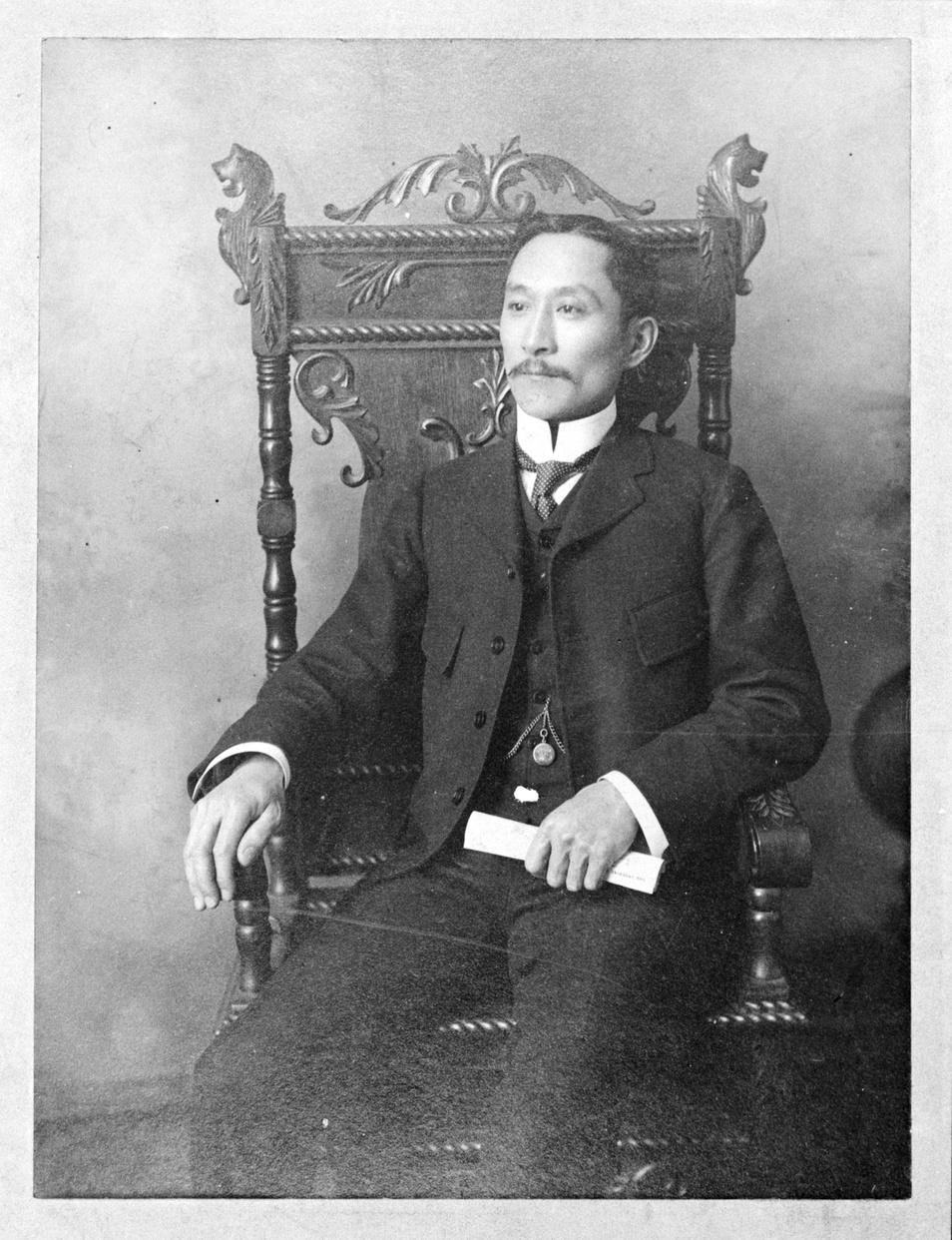Chinese Get the Vote
Alex Cumyow, the first person of Chinese heritage born in Canada, votes once again
Date: 1947
In 1898, New Westminster resident Won Alexander Cumyow cast a ballot in a provincial election. A perhaps unremarkable event today, it was a privilege reserved almost exclusively for white men more than a century ago. Shortly after Cumyow — the first person of Chinese descent born in what became Canada — made his voice heard in 1898, his right to vote was stripped from him. It would take another 51 years before Cumyow was allowed to vote again. But it’s surprising that he managed to in the first place.
In 1872, a year after British Columbia joined Canada, the provincial government barred all Chinese and Indigenous people from voting. A few years later, B.C. doubled down, threatening to fine any officials caught adding a Chinese or Indigenous name to the voter roll. It didn’t stop there. Over the following decades, B.C.’s legislature repeatedly passed laws — some nearly identical to those already on the books — forbidding Chinese people from participating in any political process, whether it be a municipal, school board or federal election. By the turn of the 20th century, B.C. had explicitly forbidden Japanese and South Asian people from voting, too.
Cumyow might have been able to register to vote in his younger years because he was born in Port Douglas, an old gold rush town at the head of Harrison Lake. But born in B.C. or not, it eventually didn’t matter. Disenfranchisement — legally prevented from voting — didn’t just stop Cumyow and countless others from having a say at the ballot box; it had far-reaching consequences that shaped their lives. A bright, ambitious man, Cumyow trained as a lawyer and could fluently speak multiple languages. But he was never allowed to practice law because his name wasn’t on the voter roll. Nor could he become a notary public or even serve on a jury. And since Asian and Indigenous people had no political agency, they had little means to combat the discrimination they faced.
The push for Chinese suffrage didn’t gain steam until World War Two. Many in the Chinese community saw the war as an opportunity to demonstrate their patriotism. Hundreds of young men volunteered to fight. During the final years of the war, B.C.’s Chinese-Canadian community began directly pressuring the provincial government to give them the right to vote. The movement was led by the Chinese Canadian Association and one of its leaders, Rev. Andrew Lam. “It is time Canada adopted a new set of principles based on a different attitude toward Canadian Chinese,” Lam declared in a 1944 speech. The following year, the government amended the Provincial Elections Act to give Japanese, Chinese, South Asian and Indigenous veterans the right to vote — but not the rest of their communities.
Chinese Canadians continued to campaign and soon partnered with allies in the South Asian community, as well as major political and social groups like the Cooperative Commonwealth Federation — the precursor to today’s New Democratic Party — and the United Church. It paid off. In 1947, B.C. extended the vote to Chinese and South Asian Canadians. Chinese Canadians could now also become fully-fledged citizens, another right that had long been denied to them. Two years later, an 88-year-old Won Alexander Cumyow voted in a federal election for the first time in more than half a century. He’s believed to be the only Chinese Canadian to vote before and after losing his right to vote. Soon after, his son Gordon became Canada’s first notary public of Chinese descent — something his father had tried to do decades earlier.
Sources:
1. Chinese Canadian Association, “Petition to the government of B.C. and the dominion of Canada,” September 1944, http://angel.library.ubc.ca/u?/coll0803-7,16431.
2. Chinese Canadian History. Chinese Canadian Military Museum Society, www.ccmms.ca/chinese-canadian-history/.
3. “Chinese Canadians Lose the Franchise.” Bamboo Shoots: Chinese Canadian Legacies in BC, Province of British Columbia with Royal B.C. Museum and B.C. Teachers, www.openschool.bc.ca/bambooshoots/teacher/gr10/resources/L3/Story%20Sheet_Chinese%20Canadians%20Lose%20the%20Franchise.pdf.
4. Chinese-Canadians Get the Vote in 1947. CBC Digital Archives, 1997, www.cbc.ca/archives/entry/chinese-canadians-get-the-vote-in-1947.
5. Courtney, John C. Right to Vote in Canada. The Canadian Encyclopedia, 18 Mar. 2007, www.thecanadianencyclopedia.ca/en/article/franchise.
6. Discriminatory Legislation in British Columbia 1872‐1948. Province of British Columbia, www2.gov.bc.ca/assets/gov/british-columbians-our-governments/our-history/historic-places/documents/heritage/chinese-legacy/discriminatory_legislation_in_bc_1872_1948.pdf.
7. Lee, Carol F. The Road to Enfranchisement: Chinese and Japanese in British Columbia. BC Studies, Summer 1976, ojs.library.ubc.ca/index.php/bcstudies/article/view/883.
8. Ma, Clayton. Won Alexander Cumyow. The Canadian Encyclopedia, 18 Nov. 2020, www.thecanadianencyclopedia.ca/en/article/won-alexander-cumyow.
9. Nicol, Janet Mary. #68 Won Alexander Cumyow. BC Booklook, 28 Dec. 2016, bcbooklook.com/2016/12/28/won-alexander-cumyow-pure-canadian/.
10. Ryder, Bruce. Racism and the Constitution: The Constitutional Fate of British Columbia Anti-Asian Immigration Legislation, 1884-1909. Osgoode Hall Law Journal, Fall 1991, digitalcommons.osgoode.yorku.ca/ohlj/vol29/iss3/5/.
11. Seibel, Brendan. These Photos Show Chinese Canadians’ Entrance into the Middle Class, after Enduring Decades of Racist Laws. Timeline, 2 May 2018, timeline.com/after-ww2-chinese-canadians-were-finally-able-to-experience-social-mobility-5630dfebcdf7.
12. Shaw, Charles Lugrin. The Oriental Wants to Vote. Maclean's, 1 Apr. 1937, archive.macleans.ca/article/1937/4/1/the-oriental-wants-to-vote.
13. Stanley, Timothy J. Schooling, White Supremacy, and the Formation of a Chinese Merchant Public in British Columbia. BC Studies, Autumn 1995, ojs.library.ubc.ca/index.php/bcstudies/article/view/1003.
14. SUPPLEMENTARY LIST OF PERSONS ENTITLED TO VOTE IN THE NEW WESTMINISTER CITY ELECTORAL DISTRICT. 8TH JUNE, 1894. British Columbia Legislative Assembly, 1894, open.library.ubc.ca/collections/bcsessional/items/1.0063559#p1z-1r0f:Cumyow.
15. Won Alexander Cumyow and the Fight for Democratic Rights. Active History, 10 Oct. 2019, activehistory.ca/2019/10/won-alexander-cumyow-and-the-fight-for-democratic-rights/.





